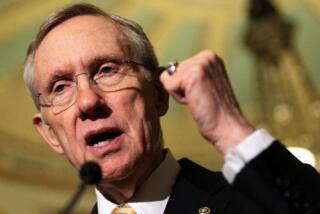Jeffords the Man in Middle
- Share via
WASHINGTON — The job, said Sen. James M. Jeffords (R-Vt.), had always been “a dream I’ve had”--chairman of the Senate committee that oversees the health, labor and education issues that the lifelong moderate cared about most.
But just as Jeffords was poised in 1996 to win the post he so wanted, newly empowered Republican conservatives argued that his independent streak made him unfit. It took the heavy hand of Senate Majority Leader Trent Lott (R-Miss.), a longtime friend of Jeffords, to persuade conservative senators to abandon plans to mount a challenge.
Today, Jeffords is still at odds with the conservatives in his own party, who have only grown more powerful. But now, more than a chairmanship is at stake. If Jeffords decides that his moderate views are better served by becoming a Democrat or independent, control of the 50-50 Senate would slip into Democratic hands. His decision is expected today.
“Well, he hasn’t told me about it, and we’re fairly close,” Gov. Howard Dean, the Democratic governor of Vermont, said Tuesday evening from his home in Montpelier. He said a party switch by Jeffords would be “a political earthquake.”
While not consulting his state’s Democratic governor, Jeffords did talk earlier this week with his Republican predecessor in the Senate, Robert Stafford. “He called just to visit back and forth,” said Stafford, 88. “He did not tell me how he was going to vote.”
Jeffords, 67, is a Vermont native and son of a judge. He looks more like a genteel country doctor than a Senate power-broker. The graduate of Yale University and Harvard Law School did a stint in the Navy before winning a state Senate seat, the job of state attorney general and, in 1974, election to the U.S. House of Representatives.
Amid the Reagan revolution of the early 1980s, Jeffords distinguished himself as the only Republican House member to vote against the new president’s 1981 tax cuts. Since then, he has bucked his party on issues ranging from abortion rights and the Family and Medical Leave Act, which he supports, to the elevation of Clarence Thomas to the U.S. Supreme Court, which he opposed.
Recently, Jeffords and fellow moderate Sen. Lincoln Chafee (R-R.I.) helped force President Bush to pare back his proposed $1.6-trillion, 10-year tax cut to a more modest $1.35 trillion over 11 years.
Jeffords and others have suggested that the White House may punish Jeffords by blocking a price-protection measure that is important to Vermont’s dairy farmers. And that potential maneuver may have played an important role in prompting Jeffords to reconsider his party affiliation.
Vermonters have a long tradition of supporting moderate Republicans. They were sometimes known as “Aiken Republicans” for George Aiken, who represented the state in the U.S. Senate from 1941 to 1975 and drew national attention for challenging his party’s support of the Vietnam War.
Jeffords won a third Senate term in November with 65.5% of the vote. Nevertheless, he has had to navigate a changing political landscape. The state Republican Party has turned more conservative, and Vermont’s recent adoption of civil unions for gay couples has only fueled the trend.
As with the Republican Party nationally, “the right wing has taken over the party here in Vermont as well,” Dean said. Jeffords, he said, was now out of step with the GOP mainstream.
Said Garrison Nelson, a professor of political science at the University of Vermont: “He is of the party of Lincoln, and Reagan and the others are of the party of Strom Thurmond,” the conservative Republican senator from South Carolina.
Despite his political beliefs, Jeffords has been a social friend to several conservatives. He joined a Senate quartet, the Singing Senators, with conservative Republicans Lott, Larry E. Craig of Idaho and John Ashcroft, who is now the U.S. attorney general.
The personal friendship with Lott was considered a big help in 1996, when conservatives threatened to block Jeffords from becoming chairman of the Senate Health, Education, Labor and Pensions Committee, a job he was entitled to by seniority. In a potential irony, Lott also helped Jeffords then in an attempt to preserve party unity.
*
Zitner reported from Washington and Mehren from Boston.
More to Read
Get the L.A. Times Politics newsletter
Deeply reported insights into legislation, politics and policy from Sacramento, Washington and beyond. In your inbox twice per week.
You may occasionally receive promotional content from the Los Angeles Times.









